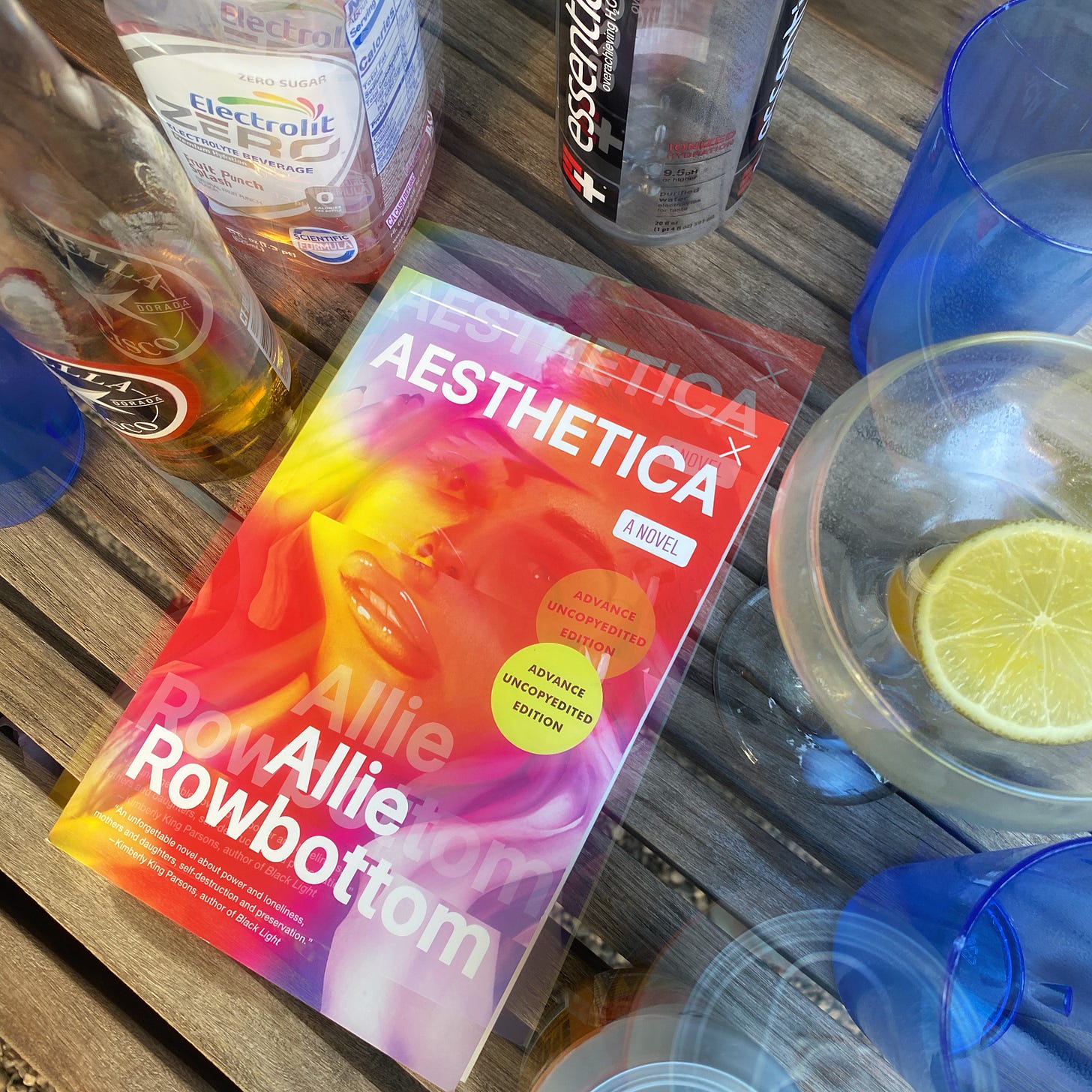Hi y’all,
When I was a kid, my grandma reassured my mother that, if I wanted, I could have my bumpy nose “fixed.” It’s a story that I find funny, but also telling. I have my grandma’s nose after all!
I think, for many women, the story of your relationship with your body contains the story of your mom’s relationship with hers. It’s like some cursed inheritance—like, congrats, you don’t just get your grandma’s nose, you also get her insecurities. And, just a guess, I think there’s a related latent memory for many women: the first time you tell your mom about something you don’t like about your body, and, rather than reassuring you, she tells you how to fix it.
Allie Rowbottom’s Aesthetica is full of women doing their sisterly (motherly?) duty: trading beauty secrets. The novel covers a lot of ground, but it’s at its best, and most painful, when describing the relationship between daughters, mothers, and their bodies.
@annawrey is beautiful, young, and on Instagram. She just moved to LA, where she hopes to become an influencer (“Almost foolish, to want to do anything else”). She meets Jake (1 million followers) who becomes her boyfriend and manager. He also bankrolls her clothes, her “lifestyle,” her plastic surgery—all of which @anna considers a win for feminism: “Like a crime I’d gotten away with. And proof of what else I could pull off.” @anna’s mom is at home in Texas, sick with unexplainable, chronic pain in the wake of cancer and an opioid addiction. @anna doesn’t return her calls.
15 years later, Anna is monstrous, old (by influencer standards), and very alone. Tomorrow morning, she will get Aesthetica, an experimental procedure that reverses plastic surgery, returning to her to “myself, my true self, stripped of time and the violence of past mistakes.” And there’s a DM in the inbox of her abandoned Instagram, a reporter asking if she’s willing to speak out about Jake.
Aesthetica is structured similarly to Kate Russel’s My Dark Vanessa. In both novels, the narrative alternates between the past and the present, where #MeToo presses in, complicating the narrators’ understanding of their youth. Both protagonists are unwilling to see themselves as a victim, unable to admit that being “chosen” by a powerful man does not lend them power.
For Anna, power means being desired, and to be desired, she has to maintain strict control over her image. But as an influencer, her image and her body are not the same. She speaks in the language of third-wave feminism, about “choice” and about “control” over her body—but she has none. She gets filler and botox and surgery the moment they’re suggested to her, though she seems to have no personal interest in any of it. She can’t say no. Her agency is in selfies, filters, posting. It’s in an ephemeral, online selfhood. After a traumatic night, she wonders, “What would have changed if I’d had my phone?”
Anna’s lack of control over her body, her pain, is a mirror of her mother’s. Her mom’s pain has no apparent cause, the blood work and scans are clean, but she demands an exploratory surgery anyway, convinced there’s something wrong. Anna also has surgery for invisible ailments—botox for nonexistent wrinkles, filler for asymmetries she can’t see. Anna’s childhood friend Leah, who is mostly logged off, has an eating disorder, another illusion of control.
Aesthetica is a book about influencers, but I’m not sure that it’s about the internet. Sure, the protagonist Anna is referred to more often by her IG handle than by her name (something Rowbottom also does in her author’s note). She feels 🔥, she seeks 💖, and she gives 🙏. Anna scrolls, Anna posts, followers 🤤. But there’s no online gossip, no online intrigue, no #cancelling. Anna calls it her “real, digital life,” but the plot of Aesthetica never moves forward because of something that happens online.
Like always, I have my lil complaints. Aesthetica can be a bit clunky on the sentence level sometimes. And I’m not sure if the novel really earns the hopeful note it ends on. Maybe that’s on purpose, a confusion of rebirth and rebranding. What does it mean to be “natural only artificially?”
But overall, Aesthetica is really gripping. I flew the book in two sittings, but thought about the book for days after. It’s exciting, especially as a debut novel, and I hope that Rowbottom continues writing along these themes.1 If you’re looking for a breezy beach read, this prolly ain’t it—but if you’re looking for something ✨, this may be your book.
Aesthetica publishes on Nov. 22nd. You can pre-order it here.
c ya friday,
Book Notes
Rowbottom already published a memoir, JELL-O Girls, about her family’s Jell-O fortune!!!!!!!!!!!!!!!!!! Wild.




I wish Aesthetica had more meat to it. Subject matter is so rich but the novel ended up feeling too light and obvious, hitting mostly just the familiar notes about the rottenness of social media culture.